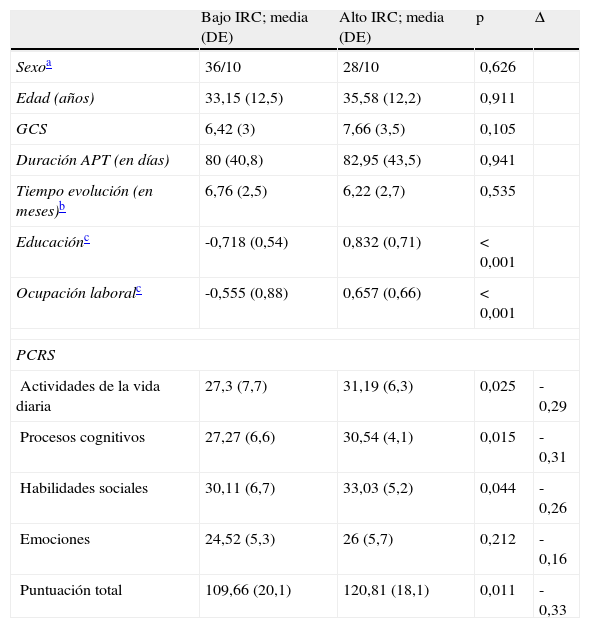Examinar el efecto de la reserva cognitiva en la recuperación tras un traumatismo craneoencefálico (TCE) moderado o grave. Diferentes autores proponen que este constructo podría explicar parte de las diferencias interindividuales respecto a la gravedad del TCE, su expresión clínica y posterior recuperación.
Pacientes y métodoEn el estudio participaron 84 pacientes que habían sufrido un TCE moderado o grave. Los participantes se distribuyeron en 2 grupos en función de su nivel educativo y ocupacional premórbido: pacientes con alta reserva cognitiva (n=46) y pacientes con baja reserva cognitiva (n=38). Se utilizó el Patient Competency Rating Scale (PCRS) para valorar el estado funcional de los pacientes.
ResultadosNo hubo diferencias significativas entre los grupos para las variables demográficas y clínicas (sexo, edad, gravedad de la lesión, duración de la amnesia postraumática y tiempo de evolución desde la lesión). Se hallaron diferencias estadísticamente significativas entre ambos grupos en el PCRS: los pacientes con alta reserva cognitiva obtuvieron mejores resultados que los pacientes con baja reserva cognitiva.
ConclusionesLos resultados sugieren que la reserva cognitiva puede mediar en la recuperación después de un TCE moderado o grave. El nivel educativo y la ocupación laboral aportarían una provisión cognitiva que se asociaría con un mejor estado funcional tras la lesión.
The aim of this study was to examine the effect of cognitive reserve in recovery after a moderate or severe traumatic brain injury (TBI). Different authors proposed that this construct might account for the mismatch between TBI severity, its clinical expression, and subsequent recovery.
Patients and methodEighty-four patients who sustained moderate-to-severe TBI participated in the study. Participants were divided into a high cognitive reserve group (n=46) or low cognitive reserve group (n=38) based on premorbid educational and occupational attainment. Patient's functional status was examined with the Patient Competency Rating Scale (PCRS).
ResultsThere were no significant differences between groups in demographic and injury variables (sex, age, severity of injury, post-traumatic amnesia duration, and time since injury). The analysis revealed statistically significant differences between the 2 groups on the PCRS: The high cognitive reserve group scored better than the low cognitive reserve group.
ConclusionsThe results of this study suggest that cognitive reserve may mediate recovery after a moderate or severe TBI. Educational and occupational attainments provide a cognitive provision that would be associated with better functional status after injury.
Artículo
Comprando el artículo el PDF del mismo podrá ser descargado
Precio 19,34 €
Comprar ahora







